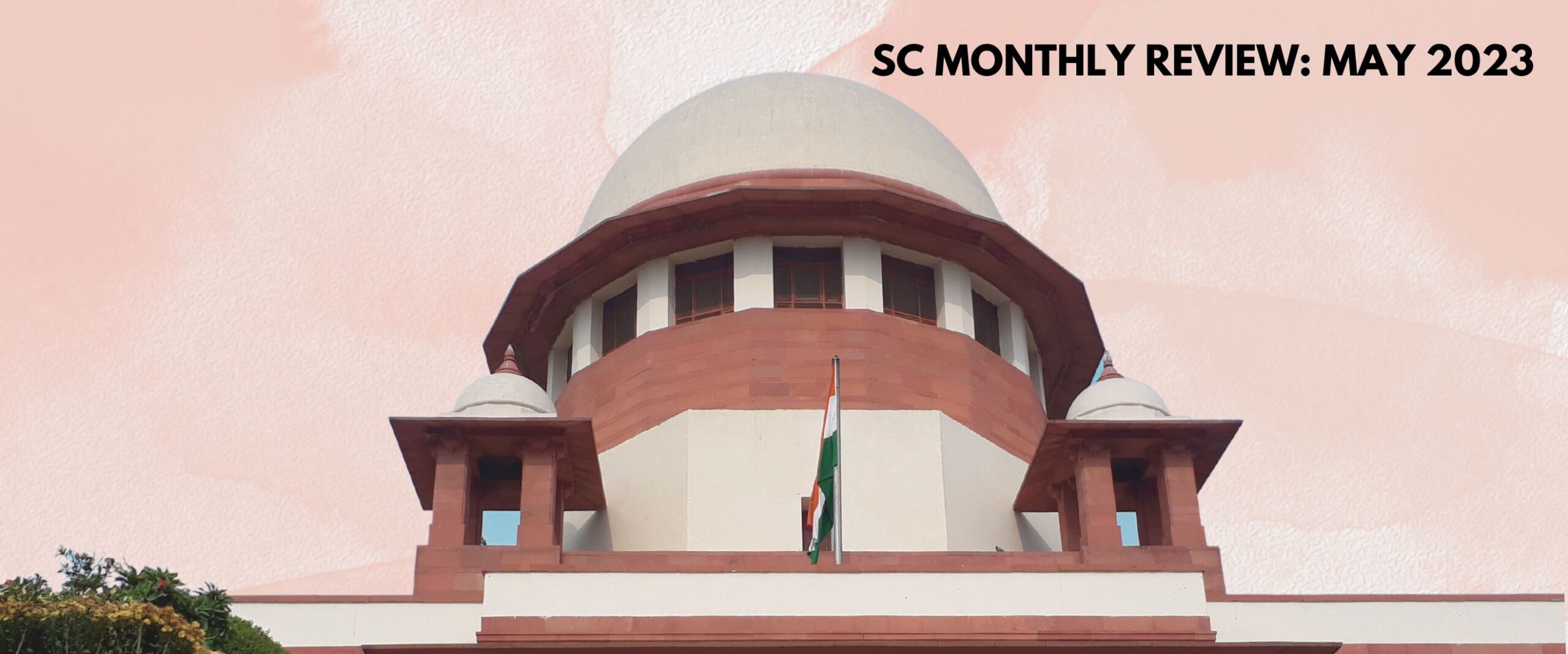Analysis
Monthly Review: May 2023
May saw the most Constitution Bench Judgements this year, and saw the retirement and appointments of two judges.

In May, the Supreme Court’s Constitution Bench activity was remarkable, as it delivered four Judgements making a notable dent in a backlog of 49 Constitution Bench cases*. This rapid activity instills hope that the SC, under Chief Justice D.Y. Chandrachud, is willing to resolve substantial questions of law that affect the daily life of the Indian people.
The month was also notable for the retirement of Justices Dinesh Maheshwari and M.R. Shah, and the swift appointments of Justices P.K. Mishra and K.V. Viswanathan.
SC Delivered Judgements in Four Constitution Bench Matters
The month began with a Judgement that recognised the SC’s power to grant divorce in a marriage which has ‘irretrievably broken down’. This marked a definitive shift in the understanding of the laws on divorce. Firstly, it simplifies the process where there is no scope for parties to reconcile, giving quick respite in an impossible situation. Second, it made a shift from fault theory—where the fault of one spouse is required as a basis for divorce, to a no-fault ground—which recognises that a marriage has broken down despite no fault.
The next two Judgements of the month were delivered on May 11th by 5-judge Constitution Benches led by Chief Justice D.Y. Chandrachud. The Court dealt with the Maharashtra Political Crisis and the tussle between the Government of the NCT of Delhi and the Union Government, over control of Delhi’s administration. Lieutenant Governor.
In the Maharashtra case, the SC declared that the governor’s decision to call for a floor test, which led to the appointment of Eknath Shinde as the Chief Minister of Maharashtra, was illegal. The Court also noted the potential misuse of the Nabam Rebia v Deputy Speaker (2016) Judgement and referred it to a larger 7-judge Bench for reconsideration. The Judgement, though legally sound, made no effect on the current Government of Maharashtra. The SC was unable to reinstate Uddhav Thackeray as the Chief Minister since he resigned voluntarily.
In NCT Delhi, the SC ruled that the democratically elected government of Delhi has control over the civil servants working in the state administration. The Court emphasised the limited discretionary powers of the Lieutenant Governor (LG) but upheld the legislative powers of the Parliament to overrule the decisions of the Delhi government. However, on May 19th, the Union executive issued an ordinance contradicting the SC’s decision which returned control of the civil servants to the LG.
The last Constitution Bench Judgement of the month concerned animal rights and its intersection with cultural rights. On May 18th, 2023, a 5-judge Bench led by Justice K.M. Joseph upheld the practice of Jallikattu, Kambala and Bailgada Sharyat. The SC held that Jallikattu is a cultural practice recognised by the Tamil Nadu legislature. Further, the TN legislature has made attempts to ‘minimise’ any cruelty faced by the animals in the 2017 Tamil Nadu Rules. Experts argue that the new rules have failed to minimise the cruelty in the sport and the Judgement is a setback for animal rights.
SC Reserved Judgements in Two Key Cases
On May 8th, 2023, a 3-Judge Bench completed hearings in the CBI/ED Tenure Extension case. The case challenged the constitutional validity of the Central Vigilance Commission (Amendment) Ordinance, 2021 and the Delhi Special Police Establishment (Amendment) Ordinance, 2021, which allows the Union to extend the tenure of the Central Board of Investigation (CBI) and Enforcement Directorate (ED) directors. The outcome of the Judgement will have significant implications for the functioning and independence of these investigative agencies.
On May 11th, 2023, after 10 days of arguments, a 5-Judge Constitution Bench led by Chief Justice D.Y. Chandrachud concluded hearing arguments and reserved its Judgement in the Marriage Equality case. The case focused on the constitutionality of the Special Marriage Act, 1954, the fundamental right to marry, ancillary rights of queer persons, the welfare of children, and the SC’s role in extending the right to marry to the LGBTQIA+ community.
SC Saw Rapid Institutional Changes
Justice Dinesh Maheshwari retired after a 4-year tenure on May 14th. Justice Maheshwari wrote a separate majority opinion in the EWS Reservation case and was part of the bench which upheld the validity of the Prevention of Money Laundering Act, 2002 & the Foreign Contribution Regulation Act, 2010.
On May 15th, Justice M.R. Shah retired after almost 4.5 years as a judge of the SC. Throughout his tenure, Justice Shah authored 712 judgements, which is the highest number of written judgements among his peers.
Only two days later, on May 16th, the Collegium recommended Justices K.V. Viswanathan and P.K. Mishra to fill the vacancies created after the retirements of Justices M.R. Shah and Dinesh Maheshwari. The Union government promptly accepted these recommendations, ensuring that the SC is restored to its full strength of 34 judges.
The Union Cabinet saw a reshuffle which has the potential to alter the dysfunctional relationship between the Union and the SC. On May 18th, Law Minister Kiren Rijiju was replaced by Arjun Ram Meghwal. Mr. Rijiju was often openly critical of the SC and its workings, especially the collegium system.
On May 23rd, the SC invited fresh bids for the use of Artificial Intelligence (AI) to further its faltering live transcription initiative. The project was proposed, on an experimental basis, by CJI D.Y. Chandrachud to record oral arguments of advocates during Constitution Bench proceedings. With this development, there is hope that the transcription project will see greater consistency.
*The pendency numbers are of Main matters as indicated on the Supreme Court Website
